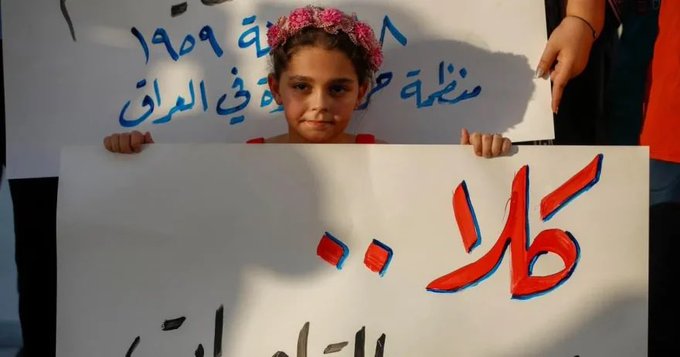Iraq, formerly known as ‘the cradle of civilisation’.
First of all, Iraq is located in the heart of the Middle East, covering an area of 435,000 square kilometres. Its neighbours are Iran, Kuwait, Saudi Arabia, Jordan, Syria and Turkey. It is also crossed by two rivers, the Tigris and the Euphrates. Iraq has always been a commercial crossroads, being situated on two of the main silk routes. it is also an ethnolinguistic crossroads, as it is surrounded by the Persian, Turkish and Arabic-speaking worlds. 80% of the population speaks Arabic meanwhile 20% speak Kurdish. Religious differences are superimposed on these linguistic differences.
Indeed, Arbophone Iraqis are 75% Shia and 25% Sunni, while the Kurds are predominantly Sunni . Sunnis and Shiites, the main branches of Islam, differ mainly over the succession of the Prophet Muhammad. The Sunnis, who are in the majority (85-90% of Muslims) believe that the Caliph should be elected among the Prophet’s companions. While the Shiites (10-15%) consider Ali, his cousin and son-in-law, and his descendants to be the legitimate and spiritual leaders. Sunnis rely on the Sunna and a decentralised religious authority, while Shiites recognise the Imams as infallible and divinely guided. They also differ in terms of practices such as prayer and the commemoration of Ashura. They are divided geographically, with the Shiites in the majority in Iran and Iraq. There are also the Yezedis and other minority groups, including Christians, Assyrians, Chaldeans and Armenians.
Political organisation of Iraq
Iraq is a parliamentary federal republic, proclaimed in 1958. The political system is based on a denominational distribution of power between the country’s main communities.
In fact, 50% of posts are held by Shiite Muslims. One of these posts is the Prime Minister, currently Mohammed Chia al-Soudani. He took office in October 2022 after a period of political stalemate following the 2021 legislative elections. Al-Sudani is affiliated to the Coordination Framework, a Shia coalition which currently dominates the Iraqi political landscape.
Then, 25% concern the Sunni community, including that of President of the National Assembly. The President of this Assembly is Mohammed Al-Halboussi. He has held this position since 2018, and was re-elected for a second term in January 2022. He is affiliated to the Taqaddum party, which focuses on pro-development and non-sectarian policies. The Assembly manages legislation and oversees government affairs in a political context marked by inter-communal tensions and divisions.
Moreover, 20% of the distribution of power goes to the Kurds, including that of the President of the Republic. Abdel Latif Rachid holds this post, elected on 13 October 2022 by the Iraqi parliament. He traditionally represents the Kurdish community ans plays a key role in appointing the Prime Minister and maintaining the country’s political balance. However, its role is mainly ceremonial. It is the prime minister who holds the real executive power. Finally, 5% of power is attributed to the ministries.
Consent in Iraq
The coalition of conservative Shiite parties is proposing an amendment to lower the age of consent for women to marry from 18 to 9.
Indeed, this is a reform of the ‘personal status law’ in force since 1959. It sets the age of consent for women at 18 and allows them to divorce. On September 17th 2024, the Federal Supreme Court of Iraq approved the proposed amendment at its second reading. This reform would allow men to ask 9-year-old girls to marry them. It could also take away women’s right to divorce and custody of children after separation and inheritance.
Moreover, the ruling coalition claims that this measure is in line with a strict interpretation of Islamic law. According to them, it aims to protect young girls from ‘immoral relationships’.
« Religious reasons »
First, the politicians behind this reform justify themselves by taking the example of the prophet Muhammed. They claim to be acting in the name of the ‘sunna’, which means the teachings, actions and words of the prophet Muhammad. This is because it is considered to be a model of conduct for Muslims. The sunna is an essential source of Islamic law after the Koran. It is the basis of Muslims’ daily life.
Indeed, the case of the Prophet would be as follows: He was about 53 years old when he married Aisha, who ‘would have been 9 years old’. According to the report, they even consummated the marriage. However, all this needs to be put into context. In the 7th century, a woman’s adulthood was determined by her first menstrual period. So we assume that if a young girl menstruates at around 9 or 10 years of age. Then we add Aicha’s 9 years and we get the age of 18. This age can be verified otherwise. It is reported that Aicha was 10 years older than her older sister Asma. Who was born in 595 so Aisha was born in 605. In addition, Aisha married the Prophet in the first year of his emigration to Medina (622).
So if we do the math we get 18. So this religious argument is not at all valid to justify this decision.
Then, According to Dr Renad Mansour, Senior Research Fellow at Chatham House, ‘This is the closest we’ve ever come,’ he told the Telegraph. ‘The movement has more momentum than ever, mainly thanks to the Shia parties. Emphasising the religious side is a way for them to try to regain some of the ideological legitimacy that has weakened in recent years », he said.
Finally, the bill still has to be approved by Parliament. The members of the coalition of Shia Muslim parties plan to reach an agreement with the Sunni parliamentarians. They are expected to promise them the release of Sunni prisoners of the Islamic State in exchange.
Consequences for the young iraki girls
First the rights of girls and women are guaranteed by international law, and this amendment completely overturns them. The lack of consent by girls to forced marriages will lead to an increase in sexual and physical violence. This will affect their health and have a direct impact on their access to education and work.
Young girls run a high risk of complications related to pregnancy and childbirth. Their bodies are still developing and are not ready to withstand the physiological changes that a possible pregnancy entails. They will suffer serious injuries, haemorrhage and even death from growth. Girls are also exposed to physical and emotional abuse. They are generally isolated with little or no decision-making power in their lives. This leads to depression, anxiety and other disorders. Then, they might lose the opportunity for education and intellectual development, making them perfect victims for manipulation and control.
‘The adoption of this bill by the Iraqi Parliament would be a devastating setback for Iraqi women and girls. But also for the rights they have managed to enshrine in law. […] Girls should be able to go to school or play in a playground. Instead of being forced to wear a wedding dress.’ , said Sarah Sanbar, an Iraq researcher at Human Rights Watch. Her work focuses on documenting human rights abuses and advocating for policy changes to address these issues. She has been involved in highlighting concerns such as the use of the death penalty in Iraq, arbitrary detentions and deportations of vulnerable populations,
‘It is explicitly written in the draft. That in the event of conflict within a couple, the husband’s sect takes precedence’, said Ms Sanbar. ‘This will remove many protections for women… it will undermine the principle of equality before the law.’
Moreover, demonstrations took place, organised by Coalition 188, an Iraqi feminist group. They called for the Iraqi judicial system to be replaced by a model inspired by the guardianship of the jurist, a Shiite legal framework giving the religious council ‘absolute power’.
‘The Iraqi Parliament must reject these dangerous amendments. Instead work to address the lamentable shortcomings of the Penal Code. Which allows ‘honour’ to be invoked as a mitigating circumstance in cases of murder of women and girls. Permits corporal punishment of wives and children by husbands. And fails to punish marital rape,’ , Amnesty International said in a statement.
‘This law is paedophile in nature’, declared Niyaz Abdulla, Iraqi Kurdish journalist and winner of the 2022 International Press Freedom Prize. She warned: ‘Iraq is going to become the worst country in the world in terms of women’s and children’s rights’.
What can the UN do?
The UN, as an international organisation, cannot directly impose laws or interfere in the domestic legislation of member states unless such actions violate international norms or universal human rights. However, it can intervene indirectly in situations where human rights violations are at stake such as lowering the age of sexual consent.
Iraq is a signatory to several international conventions that protect the rights of children and women such as the United Nations Convention on the Rights of the Child (CRC). It stipulates that children must be protected from sexual exploitation and abuse. Iraq is also a member of the Convention on the Elimination of All Forms of Discrimination against Women (CEDAW) which calls on states to protect the rights of girls and women, particularly in matters of marriage and consent.
Thereforer, if Iraq changes its legislation to lower the age of consent, it would be a violation of international conventions. There are agencies such as UNICEF (for children’s rights) or OHCHR (Office of the High Commissioner for Human Rights) that could issue monitoring reports, recommendations and resolutions. This to encourage Iraq to comply with its international obligations.
In addition, The UN can exert diplomatic pressure by engaging in dialogue with the Iraqi government and coordinating with other states to raise the issue in international forums. Human rights monitoring mechanisms, such as those of the CRC and CEDAW, can also be used to remind states of their obligations.
The UN can provide advice, recommendations and diplomatic pressure. However it does not have direct executive power to change the laws of a sovereign country. Iraq’s right to decide its own laws and family legislation remains largely an internal matter as long as these laws do not directly violate internationally recognised fundamental human rights.
In conclusion, Iraq’s proposed legislation would have severe consequences for young girls exposing them to early, forced marriages and significant physical and emotional harm. While the UN cannot directly impose laws, it can pressure Iraq through diplomatic channels and recommendations, urging the country to uphold international human rights conventions. The goal is to ensure that Iraq’s laws protect the rights and well-being of its children and women, aligning with global standards of human rights.










